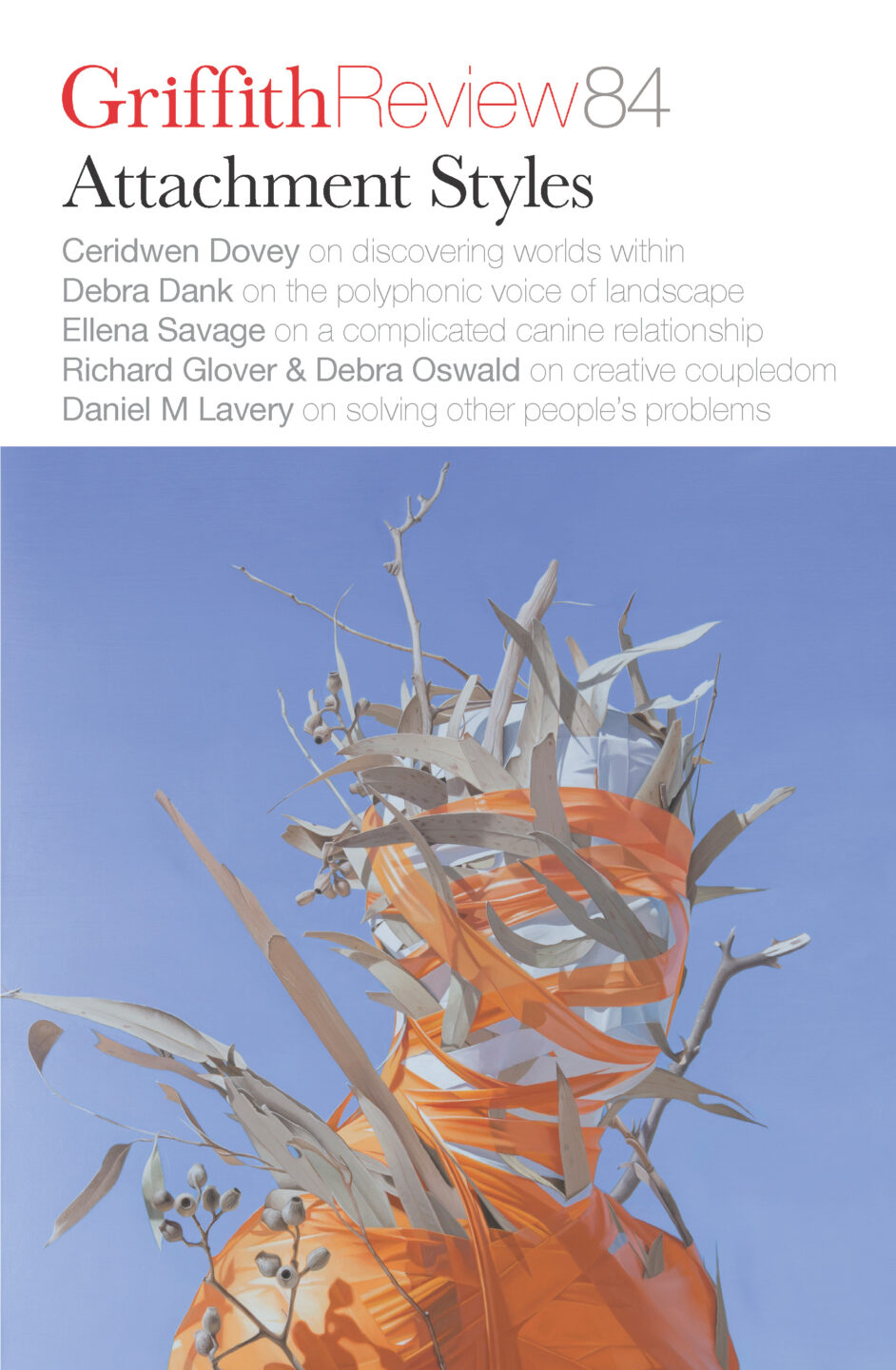Featured in

- Published 20240507
- ISBN: 978-1-922212-95-5
- Extent: 203pp
- Paperback, ePub, PDF, Kindle compatible

ONCE, ON A first date, a man asked me if I knew about attachment styles. He caught himself before he finished the sentence and laughingly said, ‘Oh, of course you do.’ He knew what I did for work; it had come up sometime in the pallid stream of texts we had exchanged before that evening. ‘I tend more towards anxiously attached,’ he said. ‘I need the validation a partner gives me. I need regular mirroring from them to process my experiences and feel seen. I don’t know why, but I always attract partners who are more avoidant.’
By the time he finished speaking, my mind had raced ahead, mapping out a possible future for us. Me, independent, fiercely self-sufficient, a mortgage owner and a dog guardian (was I avoidant?). Him, seemingly in a holding pattern in life, waiting for a partner before he could commit to a mortgage or a neighbourhood, unhappy at work, resolute and up-front about being both irresponsible and needy. There was no future. There were too many red flags. While he was self-aware and had clearly done some of the work, he’d also lost me at ‘anxiously attached’. He sounded co-dependent.
How many forms of therapy speak do you see in the two paragraphs above? Let me count them for you: attachment styles, anxious attachment, validation, mirroring, process, feel seen, avoidant attachment, red flags, self-aware, done the work and co-dependent.
At least we left out narcissism and gaslighting.
While I make light of this here, my inner monologue and the bones of our conversation reflected a tendency with which I am increasingly familiar. It is something I have railed against (while insouciantly engaging in it myself when it suits): the casualisation and degradation of meaning associated with common psychological terms.
We call this phenomenon different things. ‘Therapy speak’ is a phrase that resonates for many, reflecting the removal of therapy vernacular from the treatment room into the starkness of real life or, perhaps more commonly, the glibness of social media. The New Yorker summed it up well in a recent article by Katy Waldman:
We project and decathect; we are triggered, we say wryly, adding that we dislike the word; we catastrophize, ruminate, press on the wound, process. We feel seen and we feel heard, or we feel unseen and we feel unheard, or we feel heard but not listened to, not actively. We diagnose and receive diagnoses… We’re enmeshed, fragile. Our emotional labor is grinding us down. We’re doing the work. We need to do the work.
This emphasis on understanding and naming intrapersonal and interpersonal experiences is a stark remove from my upbringing in late 1990s India. Mental health was an altogether unknown concept, emotion was spoken about only as something unpleasant to control, and my mother’s favourite child-rearing adages were ‘spare the rod and spoil the child’ and ‘children should be seen and not heard’. Psychology was an almost unknown profession and was used more as a threatened punishment (‘if you keep behaving like this, we will send you to a psychologist and then everyone will know you are crazy’) rather than as any form of treatment or solace.
Unfortunately for my mother, I became determined to be heard, and became both a psychologist (there’s a lot of talking involved) and a writer. Much of my life has been spent in search of frameworks to help me understand the trauma that was transacted in my upbringing, and the cataclysmic emotional and relational changes wrought. Moving between the psychological illiteracy of the world I was raised in and the fluency of our current era feels like time travel.
When I first started exploring my own history in my early twenties, social media was still nascent, and I did not have easy access to the therapy language shared by influencers. I could not label my mother a ‘gaslighter’ or a ‘manipulator’, I did not know how to tell if she was a ‘narcissist’ or ‘borderline’, nor did I have the language to decide to go ‘no contact’ with her or to ‘grey rock’ her. I could read books – usually written by professionals – and I also started therapy with a trained clinical psychologist.
Almost two decades later, I have a clear understanding of my own early origin story and my mother’s, and the capacity to understand how these fit together, how I experienced and showed the abuse inflicted on me, and how I now relate to others based on my start in life. I have built well-articulated and personalised boundaries for problematic relationships.
I wonder where I would be now if I had had access to the therapy speak of social media and simply resorted to implementing boundaries designed to cut ties, instead of exploring, understanding and moving between the poles of togetherness and separation in a more nuanced way. Perhaps I would have found my trauma recovery process easier with all this information. I suspect, however, that I would also have formed a black-and-white narrative at the cost of the complexity and nuance that have allowed deep recovery.
THE TREND OF using therapy speak and diluting psychological concepts for public consumption has drawn interest (and ire) from psychologists. Two phrases have been coined to explain this phenomenon: ‘concept creep’ and ‘meaningful expansion’.
‘Concept creep’ was devised by psychology researcher Nick Haslam and reflects an unease that certain terms designed to describe our experiences of harm (trauma, prejudice, bullying, addiction) are increasingly being used for phenomena both broader in scope and less severe in intensity. Addiction is thus a neurobiological response to dopamine-eliciting substances such as methamphetamine (with all the concomitant cascades of biological changes leading to tolerance, physiological dependence and withdrawal) but also the cause of too much time spent on social media, or a reduced desire for monogamous-partnered sex thanks to the munificent slickness of OnlyFans. Trauma is both ‘actual or threatened death, serious injury, or sexual violence’ (according to the current edition of The Diagnostic and Statistical Manual of Mental Disorders, the DSM-5-TR) and also a fight with a friend, a stovetop coffee maker exploding in a froth of grounds (me this morning) or a difficult manager at work. Prejudice is systematic distrust and dislike of a person based on their group membership – such as the harms visited by the Nazis or the KKK – or Taylor Swift using the word ‘fat’ in a video and thus being discriminatory and fatphobic (phobia is, of course, a clinical term meaning ‘marked fear or anxiety about a specific object or situation’). Most women do indeed have fatphobia drilled into them, but was Taylor Swift succumbing to this internalised self-hatred, or was she simply ‘speaking her truth’ (another therapeutic truism)? And even if she was reflecting her discomfort at her own perceived fatness, is ‘fat’ a word we must now eradicate from discourse, and is describing oneself as fat truly on par with other forms of prejudice?
‘Meaningful expansion’ is a gentler and more palatable framing of concept creep. ‘When meaningful expansion occurs,’ researchers Michele Cascardi and Cathy Brown say, ‘a concept is altered in a thoughtful way to include new behaviours in new contexts,’ which ‘points toward constructive strategies for harm reduction.’ Harm reduction is a central impetus for the broadening of certain concepts, and we cannot discuss therapy speak without acknowledging that, in most instances, broadening a concept in the pursuit of greater psychological safety has great value. Formal definitions of constructs are often very restrictive and tend to focus on physical harm or on extreme examples. For instance, while the DSM-5-TR restricts its definition of ‘trauma’ to life-threatening or violent events, much research has demonstrated that other experiences – such as coercive control or emotional abuse – have similar psychological effects, with survivors of these forms of abuse demonstrating the same emotional fluctuations, cognitive changes, hyperarousal, intrusions and avoidance as survivors of physical trauma. Most expansion appears to be geared at explaining phenomena centred around harm, usually with a view to supporting people to protect themselves.
The world is full of inequities and injustices, and reducing harm and managing psychological hazards, whether at work or in one’s dating life, is undoubtedly valuable. However, experiencing some harm is an inevitable part of existence, and conflating trauma with emotional distress or non-traumatic aversive experiences is unhelpful. We shouldn’t focus on eradicating, naming and calling out harms without a concomitant focus on building the relational and self-management skills needed to tolerate emotions and the distress we all experience at various times in our lives. Otherwise, we’ll likely experience unanticipated negative psychological consequences, such as an intolerance of discomfort, increased hostility towards other social groups and those with different views, and polarisation of speech and discourse.
Instead of decrying expansion altogether, we might ask: how can it be managed in a way that is sensible, nuanced and guided by research instead of by oversimplification, well-meaning but inadequate sentiment and the market forces of social influencing? (It’s always about money, honey – and social influence is money.)
Babies and toddlers babble as they learn to speak, testing out syllables for the first time and strengthening their glottal muscles. In some ways, this parallels the psychobabble we see online, as people try out these new learnings (attachment! Trauma! ADHD!) and try to make sense of these new ways of seeing the world.
MY PREFERRED TERM for the rise of therapy speak is the values-neutral ‘conceptual expansion’. While this expansion is ostensibly about the reach of psychological notions and our renewed enthusiasm for using mental health and wellbeing as a lens through which to view the world, it’s also heavily influenced by how we use language and information. We have shared frames of experience around mental health, wellbeing, diagnoses or relationships and dating because we have communal languages and many ways to communicate information quickly now: whether in erudite but inaccessible journals, day-to-day conversation, trade literature or social media.
Maybe we can view conceptual expansion as an engine with dual pistons. The first driver is a symptom of our age: the distillation of complex ideas into linguistic soundbites for easy ingestion. As we rapidly filter through the thousand bites offered to us each second, the most accessible and digestible take precedence. We don’t often stop to consider whether these pieces of data/food/clothing are being offered to us as bottom feeders, and whether we might be better served by drifting up a little, where the offerings might be harder to digest but perhaps meatier. This is also affected by the murky world of online influencers, who are often paid by brands to sell us things, or perhaps want to sell us things themselves (‘Want to pay to become part of my circle of self-healers and heal your trauma?’) and thus deliver content that elicits quick emotion and generates clicks and engagement.
The second driver? A symptom of our enchantment with all things self and wellbeing. It would be remiss not to note here that in an increasingly secular and insular world we have lost most of the ways we have historically found meaning or closeness. We don’t have churches, dances, town squares, community meetings, large extended families or connected neighbourhoods. We aren’t quite sure why we are here or how to be here. The best we can do is bustle, be productive, send text messages, swipe left and right, and stare into the mirror of the self. In the absence of connection and communal rituals, we have turned our gaze to psychology and mental health.
We need answers to explain our isolation, our disconnection, our spiralling rates of mental illness, our general malaise and perhaps our very existence. When we lack other shared explanatory frameworks or means of finding solace, the language of the self and wellbeing can predominate. Therapy is one of our few remaining rituals, the one true connection and confessional; therapists are the new shamans; EMDR tappers the new incense cones. If we aren’t here to be good and then go to heaven, maybe we are here to self-actualise, to see past our defences, to learn about our attachment styles and do the work. If we can’t connect over impromptu backyard barbeques (who even has a backyard anymore?) or let our children play in the street (stranger danger!), maybe we can learn relational green and red flags, or find out how we are co-dependent and enmeshed. If we don’t have people to talk to, perhaps we have our therapist (or the thousands of Instagram and TikTok therapists who fill our screens with ‘if you do this, you might have ADHD’).
This is not to discount the value of therapy. Therapeutic processes have immense depth and value for people with high- and low-prevalence mental illnesses and for those who simply want to understand themselves and their own functioning. However, therapy is slow, nuanced and tailored to each individual. It’s as far removed from social media therapy speak as the rolling You Yangs are from the flint of Mt Everest. People usually arrive in therapy for succour and healing, to understand, to have compassion, and to accept and change. Online, people instead tend to want corroboration of their views, agreement, and heuristics to simplify and control life (‘if he does X on a date, then he is avoidantly attached’). Psychologists know that attachment styles are malleable, are usually not discrete categories (for example: secure, anxious or avoidant), can encompass a range of behaviours across a spectrum of severity, are co-created in each relationship, and that each person’s attachment fingerprint – how they provide and seek connection – is unique. Online, we lose all this nuance.
OVERSIMPLIFICATION IS MY biggest disagreement with therapy speak. I don’t believe that expansion is going too far, or that we are creating nations of snowflakes (better that, honestly, than nations of Donald Trumps) – just that in our bid to disseminate, we fail to consider the costs of oversimplification.
Noting the possible harm caused by the overexpansion or dilution of a construct is not to attack lived experience. Using one’s direct experience can be useful, though it’s important to be clear that one person’s experience won’t apply to all, and anecdotes are not medical or clinical advice. Lived experience has clear limits too. For instance, I work in forensic psychology with high-risk offenders, and the views and lived experiences of these individuals are important – but their insight into risk and needs is often very limited. Most offenders tell me that they pose no future risk to other people, but if I accepted this lived experience uncritically I would be risking community safety, and betraying the principles of my profession and the lived experience of another group of people – the victims of crime.
Oversimplification may also be encouraged by traditional and social media. Most people who share information via these channels are not qualified professionals, and may instead be influencers, activists, advocates and writers. In this age of science denial, there tends to be a devaluation of the expert and an insistence that all opinions are equally valid. When people spend years studying a subject, they develop broad and deep expertise. Both are essential, because to truly understand something like trauma and ADHD, for example, you need to understand things that are not trauma or ADHD. For instance, I can diagnose acute stress disorder, PTSD or CPTSD because: I know the symptoms and diagnostic criteria for these conditions as well as the diagnostic criteria for ten similar differential diagnoses; I can conduct a reliable clinical interview and know how to use assessment scales; I keep up to date with research in the field and consult other experts when unsure; I know that one of the most significant and distressing symptoms of PTSD is emotional volatility, not the flashbacks more commonly associated with the disorder; and I know that something like ‘rejection sensitive dysphoria’ (for instance, ‘when I get rejected, I feel very bad’, often described as a sign of ADHD) is not a clinical disorder or symptom as per current diagnostic taxonomies but is something many people experience. None of this learning fits into the screen grabs you might find online, and ‘I don’t know yet, it might be this, or it might be that, and there are a few ways to treat it’ does not have the ring of authority people typically seek. Similarly, ‘if you have rejection sensitive dysphoria you may have ADHD’ is more appealing and authoritative than ‘let’s do a three-hour battery of tests to assess executive functioning, working memory and attention span’.
Oversimplification has appeal because it provides easily digestible information, but the costs can be significant. If soundbites are the only way we engage with information, we train our brain to see things in black-and-white terms and build a worldview based on that (mis)information. Things are good or bad, people are nice or psychopaths and one political stance is right and the other wrong. A lot of nuance is lost, and ‘splitting’ – a common psychological defence mechanism (such as things are either good or bad, idealised or devalued) – is common. Splitting is a defence mechanism because it allows us to ignore the pain of experiencing contradictory emotions – such as love and hate towards an abusive parent – by neatly eradicating complexity. It is a more sophisticated defence mechanism than denial (simply refusing to see something), but nevertheless also precludes engagement with the complexity of the world. Each generation is characterised by certain defence mechanisms, and while denial was the currency of the past, splitting and projection (‘it’s you, not me’) characterise the way we now see the world.
Another cost of therapy speak is the significant attention being paid to some constructs while others are ignored entirely. For instance, we talk about trauma a lot, but we often ignore serious mental illnesses, such as bipolar disorder or schizophrenia; a quick look at social media shows far fewer references to these. More serious forms of neurodevelopmental conditions such as autism and ADHD are also under-represented. Some autistic people have profound disabilities with significant impairment across all areas of life and are fully reliant on care provided by others. Some people with ADHD have very severe executive dyscontrol – we often see these people in the criminal justice system, as their ADHD has contributed to chaotic lifestyles with drug use, impulsivity, recklessness and poor decision-making. The less severe forms of autism and ADHD we see online are self-selecting in some ways – to be online, to be communicating, to be able to engage with traditional and social media, one must have a certain level of functionality and socio-emotional capacity.
I have no quibble with people representing their own experiences online. What I am concerned about is false representations, and the people and difficulties we are unable to see because they cannot represent themselves. In addition to certain forms of disorders being ignored, there is a whole cache of valuable psychological expertise and skills that are not being discussed. When I work with trauma clients, we rarely discuss gaslighting, attachment styles or trauma bonding. Instead, we talk about values-based living, tolerating discomfort, reappraising safety, understanding cognitive patterns, defusing thoughts and adaptively responding to emotion. These skills are the true work, taking years and much practise to build, and they are deeply unsexy – perhaps why they receive almost no airtime online.
Ultimately, the knowledge we hold, disseminate and focus on will indeed build the world around us. Navigating the long arm of technology and social media requires the capacity to think critically about how we assess the credibility of information, and how we then use that information. Ignoring this process leaves us open to misinformation, polarisation and being buffeted by whichever fad is in vogue.
Photo credit: Rivage from Unsplash
Share article
More from author

Interstitial
Non-fictionAmerican sociologists John and Ruth Hill Useem first coined the term ‘third culture kid’ in the 1950s to describe the experience of Americans who were raised abroad in a culture different to their birth culture. This term reflects the way children raised overseas straddle three cultures: the culture of their birth, the culture within which they are raised, and a third, nebulous culture – the culture they create through the way they learn to relate to each other. The third culture is interstitial, not an amalgam. ‘Third culture kid’ (TCK) is a term often used as shorthand. Many TCKs will have experienced more than one cultural shift too. Those with diplomatic, military or missionary families are often raised in multiple countries, and others, like me, will continue their travels overseas as adults too, exercising the global and economic mobility they know well.
More from this edition

Lincoln Wimbley writes a story at 37,000 feet
FictionThen last week, in that bar. Lincoln never a big bar guy. But Professor Tim suggested, ‘Get out in the world!’ Somewhere all new. So, a bar. The bartender asked, ‘A beer?’ Lincoln hated cans. Hated bottles. Hated beer. But asked for something on draft. On tap. Explained why he was there, a first-timer, hunting for a story. Bartender laughed. Said elsewhere’s probably best. ‘None of the sad sacks here come with a happy ending.’

Exemplary
Poetry The superego’s unvarying verdict: you have failed, you deserve it, get over it! Stay in your own psychotic micro-enclave, opining about enactment and re-enactment. Now and again there’s...

Getting attached
IntroductionMore than fifty years after Larkin lamented the emotional inadequacy of generations past, we’ve equipped ourselves with an extensive vocabulary with which to characterise, analyse and diagnose our relationships with ourselves, with others, and with the places, objects and ideas that shape our sense of who we are and who we wish to become. Yet still we face the same old set of conundrums: from parasocial connections and fractious family politics to the solace we seek in non-human entities, our myriad attachments continue to offer us comfort and complication in equal measure.